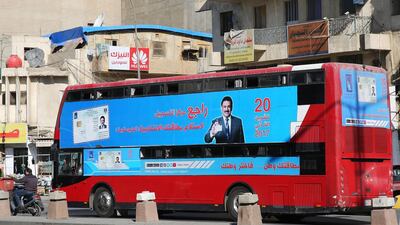Iraq's parliament on Monday confirmed May 12 as the date for parliamentary elections, despite calls from some of the country's Sunni politicians to delay the vote.
Prime minister Haider Al Abadi, who is seeking re-election, had stressed that any slippage over the timing would be unconstitutional.
Lawmakers failed to reach an agreement on Saturday when they last met to discuss the election date. Sunni and Kurdish politicians had demanded that the vote be pushed back at least one year to allow hundreds of thousands of citizens displaced by the battle against ISIL to return home and cast their ballots.
The winner will face the challenge of rebuilding a war-torn country in the wake of a brutal conflict with ISIL and in the midst of a battle against corruption that is eating away at its oil revenue.
________________________________
Read more:
Iraq PM insists elections will be held on time
Iraq: Abadi’s electoral alliance collapses after just one day
________________________________
A deadlock in Iraq's deeply divided parliament prompted the country's supreme court to issue a ruling on Sunday against any further delay on the election date, saying it must be held "within the time frame provided by the constitution".
The issue of civilians uprooted from Sunni Muslim areas previously under ISIL has become the latest bone of sectarian-tinged political contention in Iraq.
Parliamentary speaker Salim Al Jabouri said the government is committed to returning the displaced and to creating a peaceful atmosphere for the elections.
Meanwhile, the US embassy in Baghdad stressed that "postponing the elections would set a dangerous precedent, undermining the constitution and damaging Iraq’s long-term democratic development".
Washington said it would "provide assistance that will help ensure that Iraqi voices are heard and counted" during the elections process.
Mr Al Abadi, whose popularity surged as a result of his successful leadership during the war on ISIL took over in 2014 from Nouri Al Maliki amid sectarian chaos.
Mr Al Maliki came under fire for his role in the army's collapse, as ISIL swiftly took control of a third of Iraq.
The prime minister, however, vowed to rise above sectarian divisions by leading a mixed list of candidates as head of a "Victory Alliance".
Shiite paramilitary troop leaders that fought ISIL led by Hadi Al Amiri along with Mr Al Maliki who currently serves as one of three vice presidents and followers of Shiite cleric Muqtada Al Sadr are expected to be Mr Al Abadi's main rivals.
However Mr Al Jabouri has vowed to create a peaceful atmosphere for the elections by limiting the armed participation of militias in the process.
“All weapons must be in the hands of the government during election campaigns and the voting day.”
Despite the declared victory over ISIL, Iraqi and American officials have warned the group is likely to continue in the form of insurgent-style attacks.
Last week, twin suicide attacks carried out by ISIL killed at least 46 and wounded more than 100 in Baghdad.
Attacks have recently rocked the northern towns of Tal Afar and Hatra, both recaptured last year from the extremist group.
The personality of the prime minister will be vital for the country in order to attract reconstruction funds at a conference planned for this purpose in Kuwait in February.
Baghdad says at least $100 billion (Dh367bn) will be needed to rebuild houses, businesses and infrastructure destroyed during the war.
However, deep-rooted corruption remains an obstacle to attracting investment.
The country was ranked 166 out of 176 nations in Transparency International's Corruption Index for 2017, which said the country continued to score among the worst in the world on corruption and governance indicators.
May's elections will be the fourth since the 2003 US-led invasion that toppled dictator and former president Saddam Hussein.


